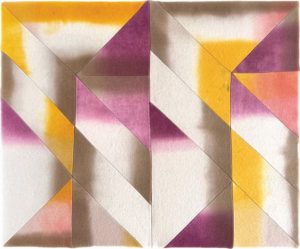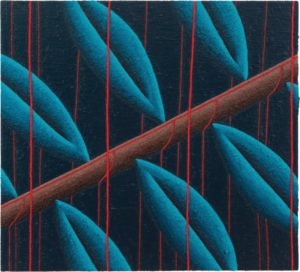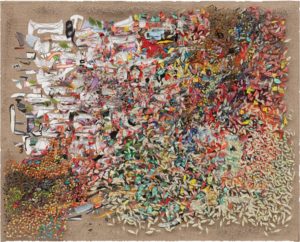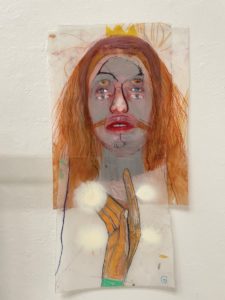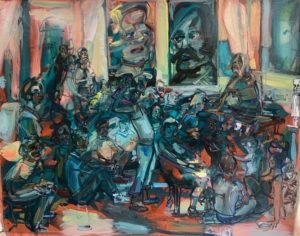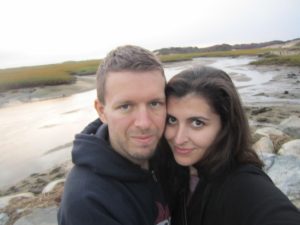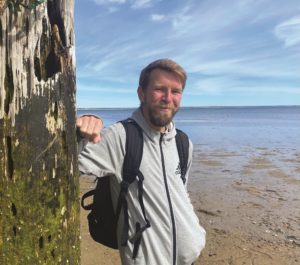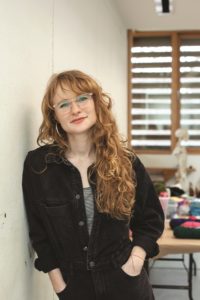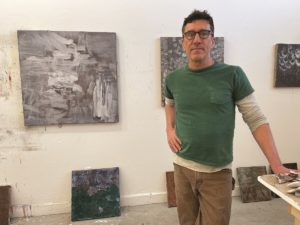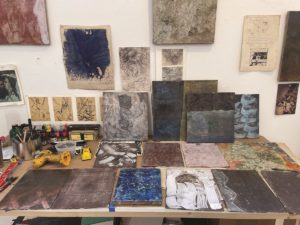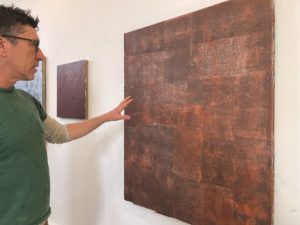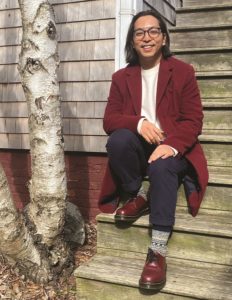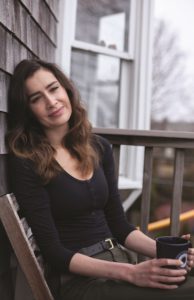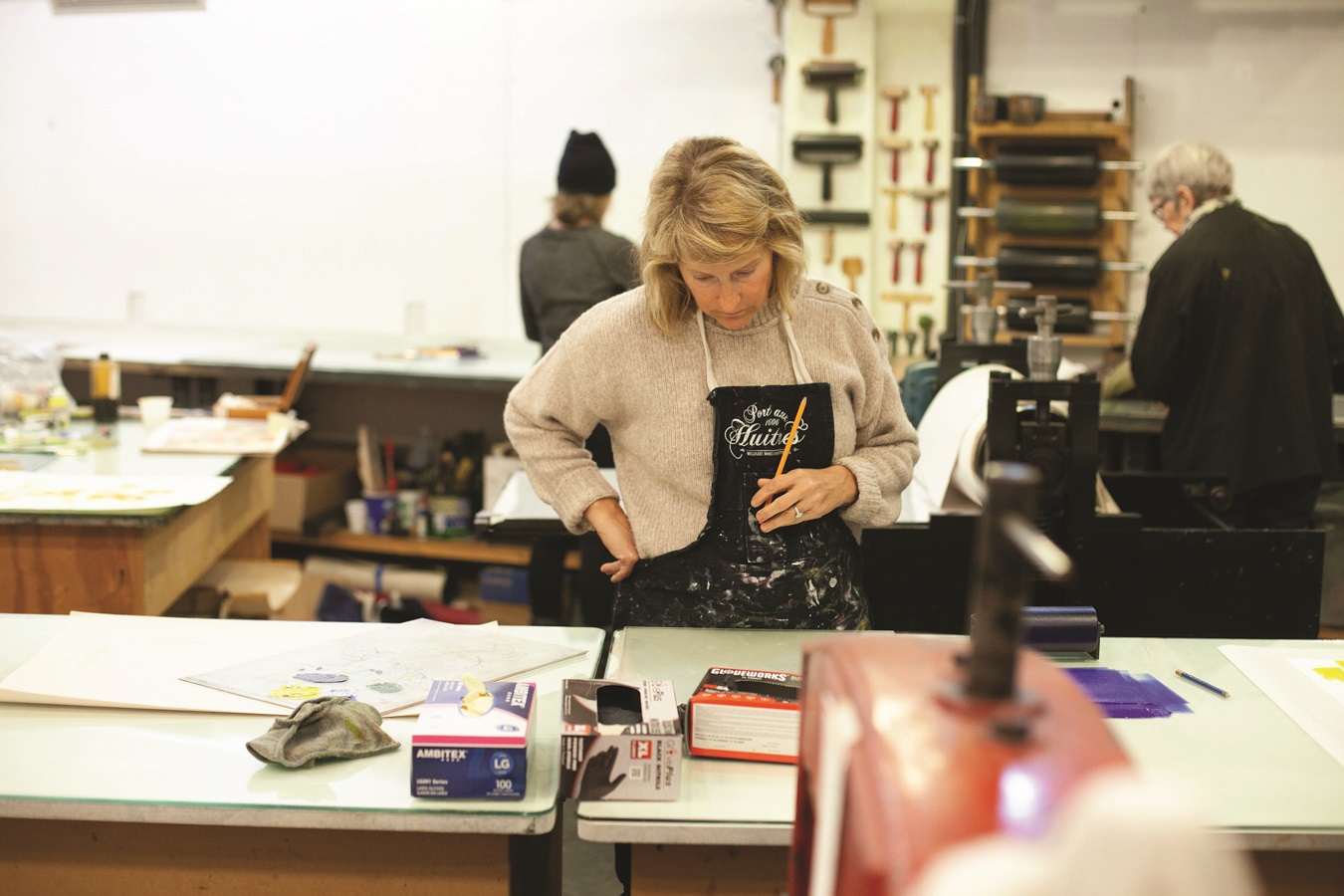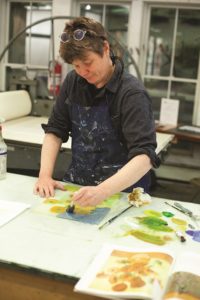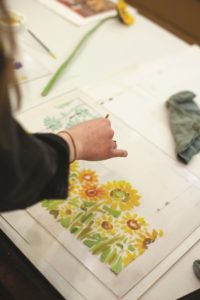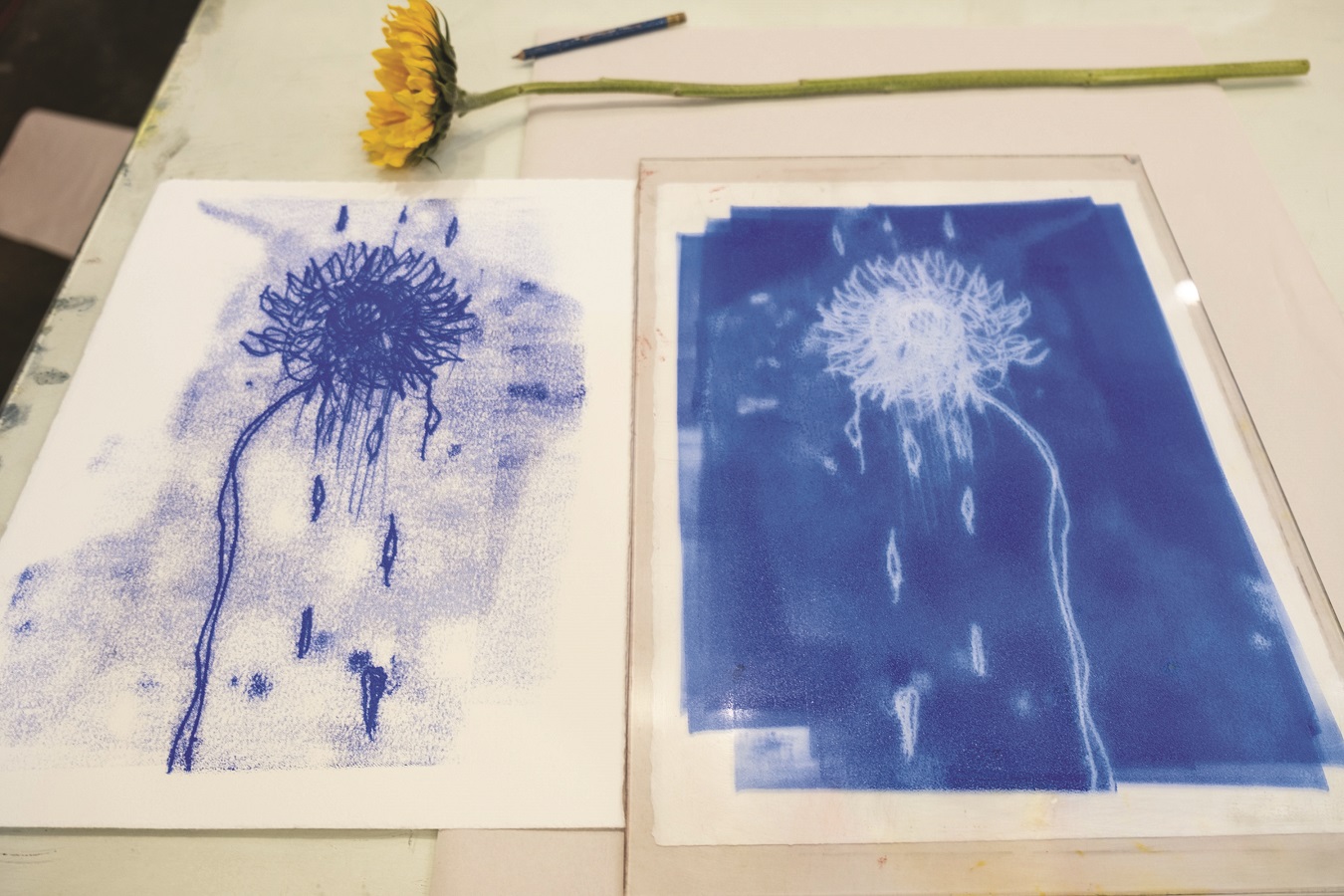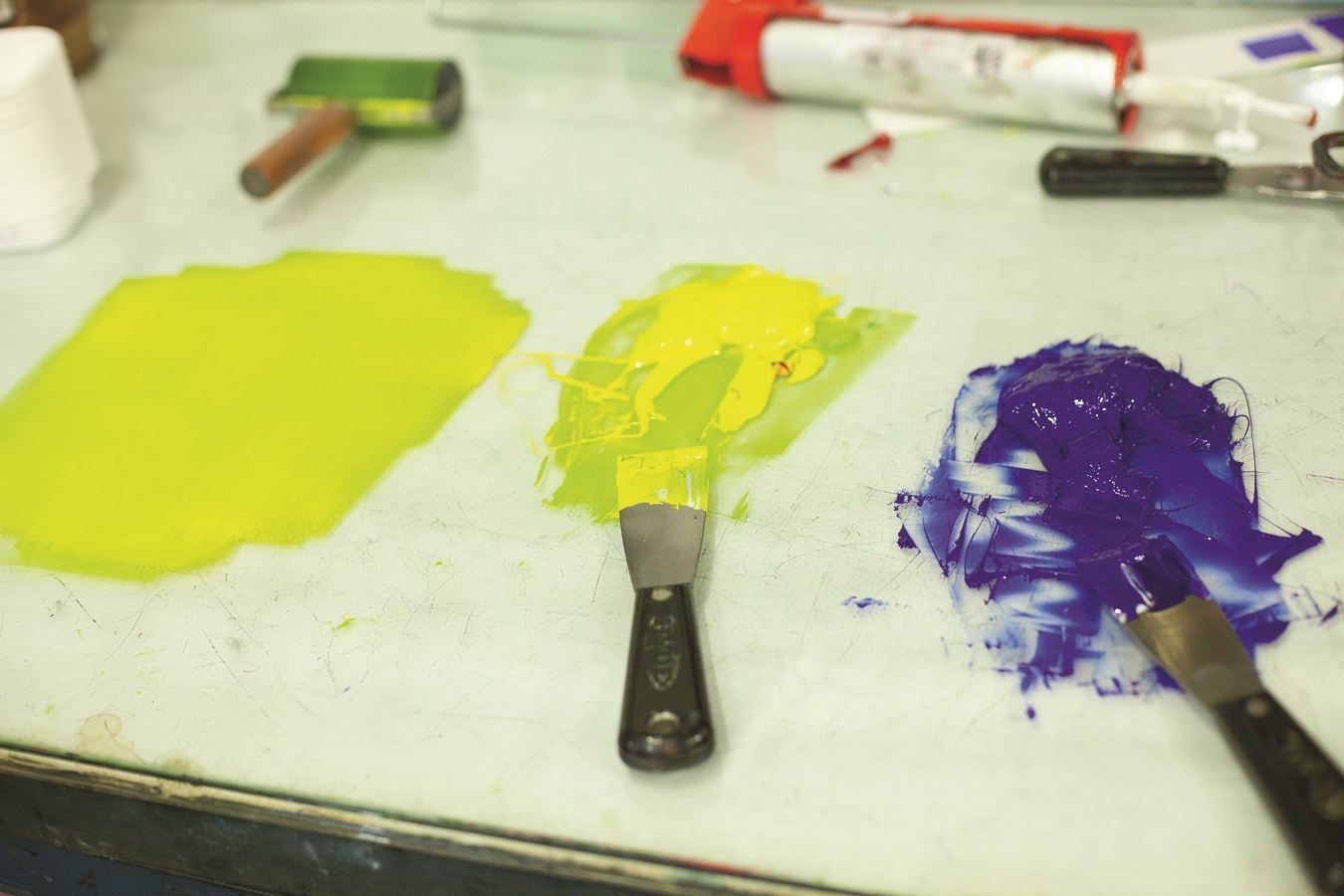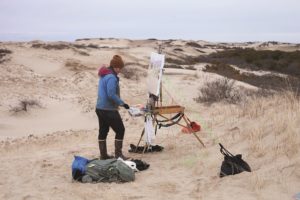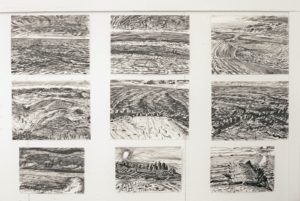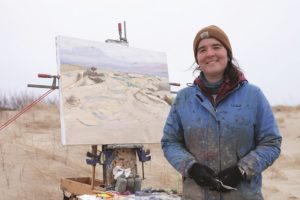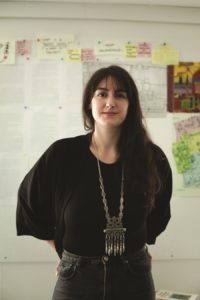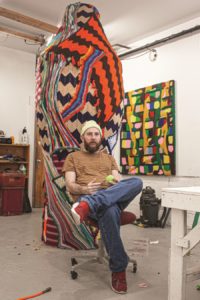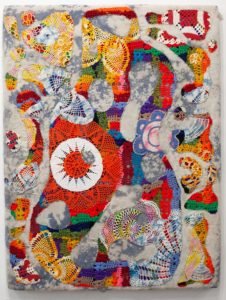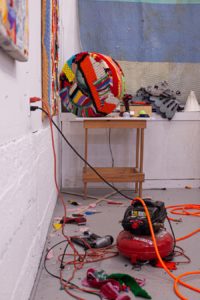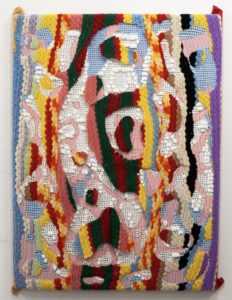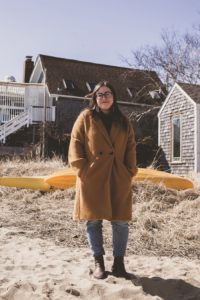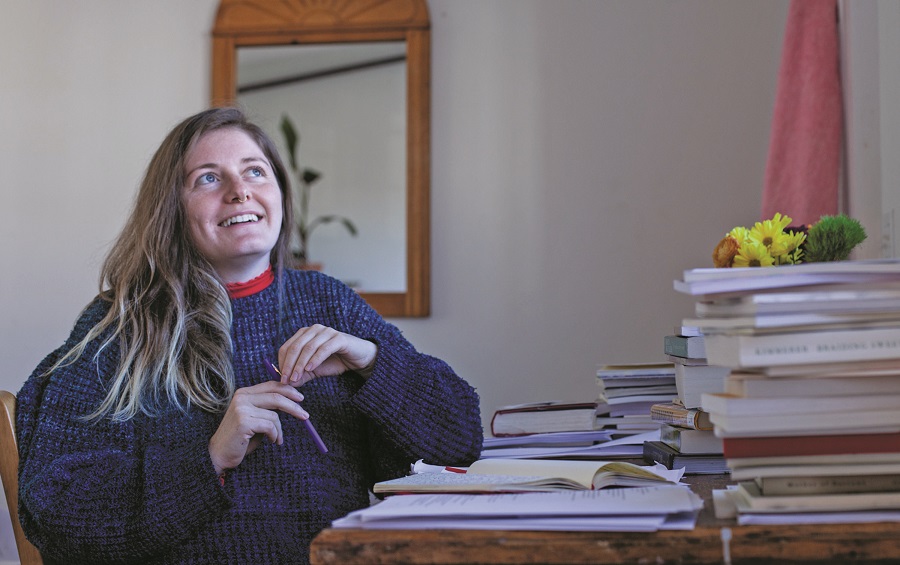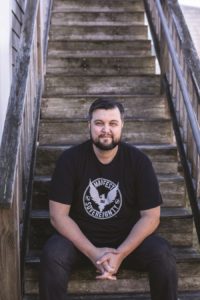Georgia Dickie, who is from Toronto, and Tinja Ruusuvuori, who lives and works in Tampere, Finland, had never met before arriving in Provincetown for their Fine Arts Work Center fellowships last year. But their bond was immediate.
“We were both experiencing something along the lines of soft burnout,” says Dickie.
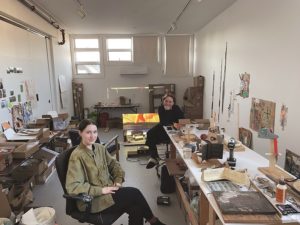
Ruusuvuori corrects her. “Hard burnout,” she laughs.
Dickie agrees. “Why am I so hesitant to admit it? We were both really burned out.”
The artists’ dialogue about productivity pressure, navigating a regimented art scene, and seeking new ways of being in a cataclysmic world soon became a studio collaboration. At the FAWC fellows showcase on Friday, Feb. 24, Ruusuvuori and Dickie will present a unified installation.
Dickie, who received her B.F.A. in sculpture from the Ontario College of Art & Design, specializes in manipulating what she calls “low rung materials” in ways designed to upend viewers’ expectations. In her piece currently on view at the Provincetown Art Association and Museum, detritus appears to spill out of sculptural bounds. “I’m using the discarded material of society to create a new world,” she says.
Ruusuvuori, who studied filmmaking in Helsinki and fine art in Glasgow, won acclaim for her film Untitled (Burned Rubber on Asphalt, 2018), also showing at PAAM. Suffused with politics, her work has increasingly turned toward defamiliarizing the politesse of modern life. “It’s nice to think about yourself as an alien that just landed and is thinking — is this really reasonable?” she says.
Both artists have felt liberated by the resources and community of the FAWC fellowship — and by the artistic ethos of the Outer Cape, where creativity is the norm rather than the exception. “It’s so revolutionary, even for us who both come from countries where there is some funding for arts,” says Ruusuvuori.
The opportunity to produce work unfettered by expectation — not to mention having studios across the hall from one another — has allowed Ruusuvuori and Dickie to counter the isolation that often accompanies being a working artist. The process has been organic: “Our collaboration is made possible by the conditions of where we are right now,” Dickie says.
Ruusuvuori and Dickie excavate the alchemy of their shared practice. Only after an hour of riffing on the existential quandaries that animate them do they begin to talk about the project itself.
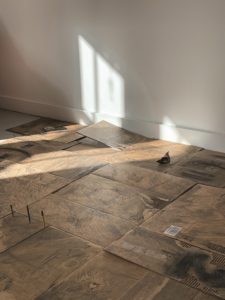
The idea for their installation emerged during a walk through one of Provincetown’s cemeteries. With a filmmaker’s eye for subverted landscapes, Ruusuvuori had been thinking about aimless maps; Dickie, who displayed built-out cardboard boxes that were shipped to the gallery at her last exhibition, had already collected more cardboard from the rest of the fellows after move-in day.
It was Ruusuvuori who suggested that they experiment with drawing on the cardboard. “Then Georgia said, ‘The cemetery is like a useless city,’ ” says Ruusuvuori. “And it just kept going in different directions.”
The two started with an intricately developed floor landscape where death and capitalism converge on cardboard memorial stones. Amazon logos are alternately reproduced and scratched out on their surfaces. “We sat really comfortably, sharpened a bunch of pencils, and just started drawing on these tiles,” Dickie says. They estimate the finished cardboard “carpet” will stretch to 10 by 15 feet. Experiments in printmaking, texturing, and figuration followed.
The rest of the project ripples out from this act of spontaneous co-creation. Dickie has constructed two open-faced cardboard dioramas that rise to knee height, one of which resembles a theater. Ruusuvuori’s ongoing video project Collection of Undoings, a “crowdsourced archive” of vignettes, is projected onto a cardboard sheet, at once stately and prosaic in its presentation. Another diorama will feature a video piece that grew out of a monitor error.
Dickie sees the figures in Ruusuvuori’s videos as “traversing and moving through the space” of her cardboard environments, animating their “multiverse of scales.” Words, too, will be a part of the installation: Kieron Walquist, a FAWC poetry fellow, has composed a series of meditations on the pieces. Currently, they adorn the walls of Ruusuvuori’s studio.
The defiantly open-ended quality of the multimedia assemblage reflects the shared resistance to commercial production that brought the artists together in the first place. “I feel like we are inventing that kind of being,” Ruusuvuori says.
“It’s very exploratory, very experimental,” Dickie says. “Every day, we’re making new connections, right in the throes of it.”
In this way, form generates content — or vice versa. Or perhaps everything flows into and out of the project at once. “There is some chaos, but it exists within our setup,” says Dickie. “We’re creating a system for the nonsensical to be able to occur.”
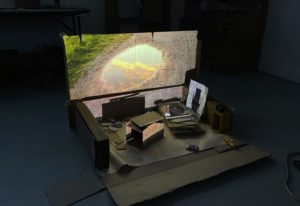
Anyone seeking to extract a definitive meaning from Ruusuvuori’s and Dickie’s piece will be disappointed. The visual language of the repurposed cardboard carpet evokes themes of environmental collapse, and an anti-capitalist ethos animates Ruusuvuori’s cinematic “undoings.” But thinking in such terms, Dickie says, makes her “fissure.”
“Some people will see that there’s poetry there,” says Dickie. “I think other people will find it confusing. But I hope it just challenges them to question the world.”
“Even if people think it’s nonsense, that’s activating some brain cells,” Ruusuvuori adds.
Despite their different perspectives and backgrounds, the two share an intellectual synergy, and each has a profound trust in the other’s vision. Ruusuvuori tends to preempt viewer perception, almost to a fault. Conversely, Dickie is “willing to just offer up my work without taking much responsibility at all for how it’s understood,” she says. “Tinja pushes me to think harder about what connections are being made.”
Ruusuvuori is pleased to hear this and returns the compliment. “You really encouraged us to try out things and just start making,” she says to Dickie.
And while the process has had its share of trials, creating the installation has invigorated both artists. “I forgot that amazing things can happen outside of extreme pressure and deadlines,” Dickie says.
After the fellowship, Ruusuvuori and Dickie will return to their home studios. The ending will be bittersweet. “The work feels like a documentation of our time here,” Dickie says. They’ve already discussed the possibility of collaborating in the future but agree it would have to be site-specific.
“I wouldn’t be surprised if we just continued working in the world and then found out we were working on something similar,” Ruusuvuori says. “Because I feel like that consciousness is always there.”
Fellow Friday
The event: Work by visual arts fellows Georgia Dickie and Tinja Ruusuvuori and writing fellows Gothataone Moeng and Jorrell Watkins
The time: Friday, Feb. 24, 5 to 8 p.m.
The place: Fine Arts Work Center, 24 Pearl St., Provincetown
The cost: Free; registration is requested at fawc.org.
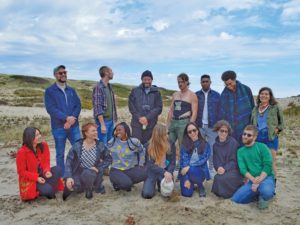
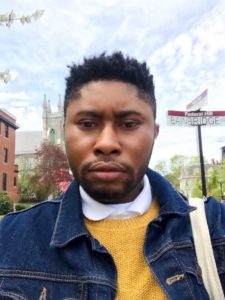 Bhion Achimba (the pen name of Chibuihe Obi Achimba) is a Nigerian poet and essayist who is currently working on an M.F.A. degree at Brown University. The founding editor of Dgëku Magazine, his work has been or will soon be published in the New York Times, the Paris Review, and the Harvard Review. The St. Botolph Club Foundation named Achimba one of 2021’s Emerging Artists in New England.
Bhion Achimba (the pen name of Chibuihe Obi Achimba) is a Nigerian poet and essayist who is currently working on an M.F.A. degree at Brown University. The founding editor of Dgëku Magazine, his work has been or will soon be published in the New York Times, the Paris Review, and the Harvard Review. The St. Botolph Club Foundation named Achimba one of 2021’s Emerging Artists in New England.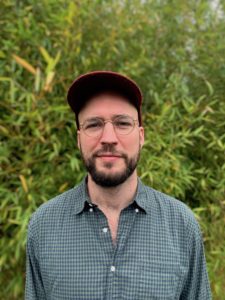 Willie Fitzgerald was the first-ever Mari Sabusawa Editorial Fellow at American Short Fiction. With a novel and short-story collection in the works, Fitzgerald has been published — or soon will be — in StoryQuarterly, Joyland Magazine, and Boulevard.
Willie Fitzgerald was the first-ever Mari Sabusawa Editorial Fellow at American Short Fiction. With a novel and short-story collection in the works, Fitzgerald has been published — or soon will be — in StoryQuarterly, Joyland Magazine, and Boulevard.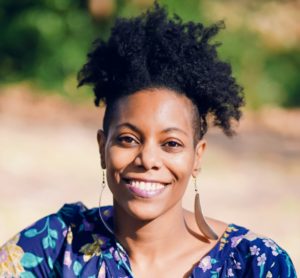 Kim Coleman Foote has novels in progress about the trans-Atlantic slave trade and about her own family’s journey during the Great Migration. Her work appears in The Best American Short Stories 2022, and she has received grants from the National Endowment for the Arts and the Center for Fiction.
Kim Coleman Foote has novels in progress about the trans-Atlantic slave trade and about her own family’s journey during the Great Migration. Her work appears in The Best American Short Stories 2022, and she has received grants from the National Endowment for the Arts and the Center for Fiction.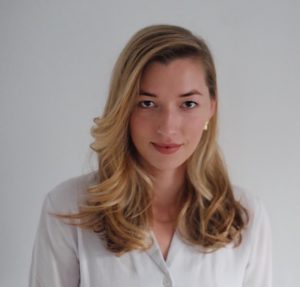 Hannah Perrin King is a poet from rural California whose manuscript is a National Poetry Series finalist. Winner of the 11th Annual Poetry Contest coordinated by Narrative Magazine, King has had poems published in THRUSH Poetry Journal, Best New Poets, and the Missouri Review.
Hannah Perrin King is a poet from rural California whose manuscript is a National Poetry Series finalist. Winner of the 11th Annual Poetry Contest coordinated by Narrative Magazine, King has had poems published in THRUSH Poetry Journal, Best New Poets, and the Missouri Review.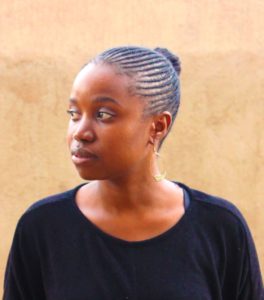 Fiction writer Gothataone Moeng, who earned an M.F.A. in creative writing from the University of Mississippi, is originally from Botswana. Recipient of a 2018-2020 Wallace Stegner Fiction Fellowship, her work has appeared in the Oxford American and A Public Space.
Fiction writer Gothataone Moeng, who earned an M.F.A. in creative writing from the University of Mississippi, is originally from Botswana. Recipient of a 2018-2020 Wallace Stegner Fiction Fellowship, her work has appeared in the Oxford American and A Public Space.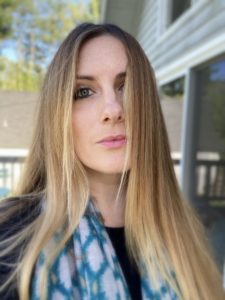 Christa Romanosky is a poet, musician, and fiction writer who is returning as a FAWC fellow following her first stint in 2017-2018. Romanosky has an M.F.A. from the University of Virginia. Her work is about “rural spaces, trauma, and extraction,” according to FAWC’s website. It has appeared in Best American Short Stories 2021 and EPOCH Magazine.
Christa Romanosky is a poet, musician, and fiction writer who is returning as a FAWC fellow following her first stint in 2017-2018. Romanosky has an M.F.A. from the University of Virginia. Her work is about “rural spaces, trauma, and extraction,” according to FAWC’s website. It has appeared in Best American Short Stories 2021 and EPOCH Magazine.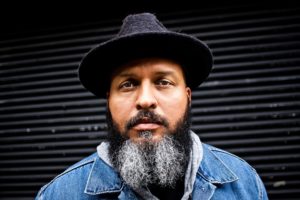 Returning FAWC fellow John Murillo has won prizes from the Poetry Society of America, Pushcart, the NAACP, and the T.S. Eliot Foundation. Author of the poem collection Up Jump the Boogie, Murillo’s work has appeared in American Poetry Review and Best American Poetry 2017, 2019, and 2020. He directs Wesleyan University’s creative writing program.
Returning FAWC fellow John Murillo has won prizes from the Poetry Society of America, Pushcart, the NAACP, and the T.S. Eliot Foundation. Author of the poem collection Up Jump the Boogie, Murillo’s work has appeared in American Poetry Review and Best American Poetry 2017, 2019, and 2020. He directs Wesleyan University’s creative writing program.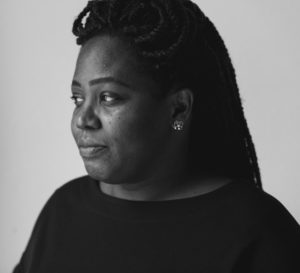 Clarisse Baleja Saïdi’s writing has been published in The Fiddlehead and Poetry, and she is now writing a novel. Hailing from Côte d’Ivoire, Saïdi has won a grant from the Canada Council for the Arts. She earned an M.F.A. from the University of Michigan.
Clarisse Baleja Saïdi’s writing has been published in The Fiddlehead and Poetry, and she is now writing a novel. Hailing from Côte d’Ivoire, Saïdi has won a grant from the Canada Council for the Arts. She earned an M.F.A. from the University of Michigan.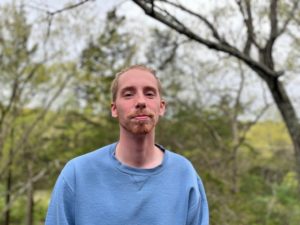 Kieron Walquist, a queer, neurodivergent writer and “hillbilly from Missouri,” has an M.F.A. from Washington University in St. Louis. Walquist’s work appears in Bennington Review and Iron Horse Literary Review.
Kieron Walquist, a queer, neurodivergent writer and “hillbilly from Missouri,” has an M.F.A. from Washington University in St. Louis. Walquist’s work appears in Bennington Review and Iron Horse Literary Review.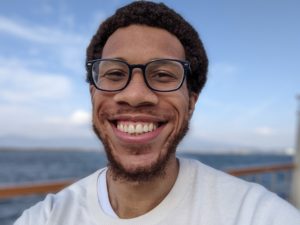 Poet and playwright Jorrell Watkins is a former Fulbright Japan Graduate Research Fellow with an M.F.A. from the University of Iowa Writers’ Workshop. The prize-winning author of multiple chapbooks, Watkins contributed to the Poetry & Practice series organized by the Poetry Foundation.
Poet and playwright Jorrell Watkins is a former Fulbright Japan Graduate Research Fellow with an M.F.A. from the University of Iowa Writers’ Workshop. The prize-winning author of multiple chapbooks, Watkins contributed to the Poetry & Practice series organized by the Poetry Foundation.